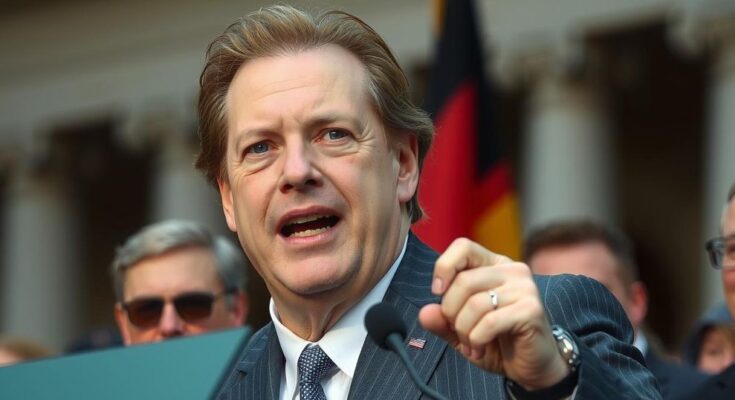Elon Musk has endorsed Alternative for Germany (AfD), prompting anger and accusations of election interference from German politicians, including Friedrich Merz. His social media post and subsequent opinion piece claimed the party offers solutions to Germany’s economic and cultural challenges. The endorsement led to resignations and heated debates about foreign influence in German elections, highlighting tensions surrounding the rise of far-right politics.
In a surprising turn of events, billionaire entrepreneur Elon Musk has endorsed the far-right political party Alternative for Germany (AfD) amidst the run-up to Germany’s elections scheduled for February 23. His declaration via social media—”Only the AfD can save Germany”—has attracted widespread criticism, sparking a political earthquake that led to resignations within media circles and accusations of election interference from German leaders, including Friedrich Merz, who heads the opposition Christian Democratic Union (CDU).
Musk, close to former U.S. President Donald Trump, argues that the AfD offers necessary solutions to what he perceives as an impending economic and cultural crisis in Germany. In an article published in the German newspaper Welt am Sonntag, he extolled the party for potentially revitalizing a nation hindered by bureaucracy and the challenges of immigration, urging critics to overlook the party’s labels and consider its platform.
His comments have intensified existing tensions; Eva Marie Kogel, the opinion editor at Welt am Sonntag, resigned in protest shortly after the publication of Musk’s article. The paper itself quickly countered Musk’s assertions through an op-ed that defended its journalistic integrity, while also credible criticism arose from various political factions. The ruling Social Democratic Party denounced Musk, and key figures, including the government spokeswoman, condemned his intervention, asserting that “freedom of speech also includes the biggest nonsense.”
However, some allies, such as CDU member Thorsten Frei, defended Musk’s right to express his views, emphasizing that his influence on the election process remained within legal bounds. As the debate continues, Musk has reiterated his significant role in the German industrial landscape, which he believes qualifies him to make such public political statements.
The political landscape in Germany is highly charged, particularly with the emergence of Alternative for Germany (AfD), a party considered far-right by many mainstream political entities. Elon Musk’s endorsement comes just two months before crucial elections, complicating the dynamics as major political figures voice their concerns about foreign influence in domestic politics. This controversy highlights the interplay between social media influence, public opinion, and political strategy as Musk, a global entrepreneur, intervenes in a foreign electoral process.
The controversial endorsement of the AfD by Elon Musk has sparked significant outrage and debate within German politics, drawing accusations of election interference from various political leaders. While Musk defends his comments as a critique of Germany’s current political landscape, the ramifications of his statements may have profound implications for the upcoming elections. This situation underscores the challenges posed by external influences on national politics and illustrates the ongoing struggle over political narratives in modern democracies.
Original Source: voz.us




